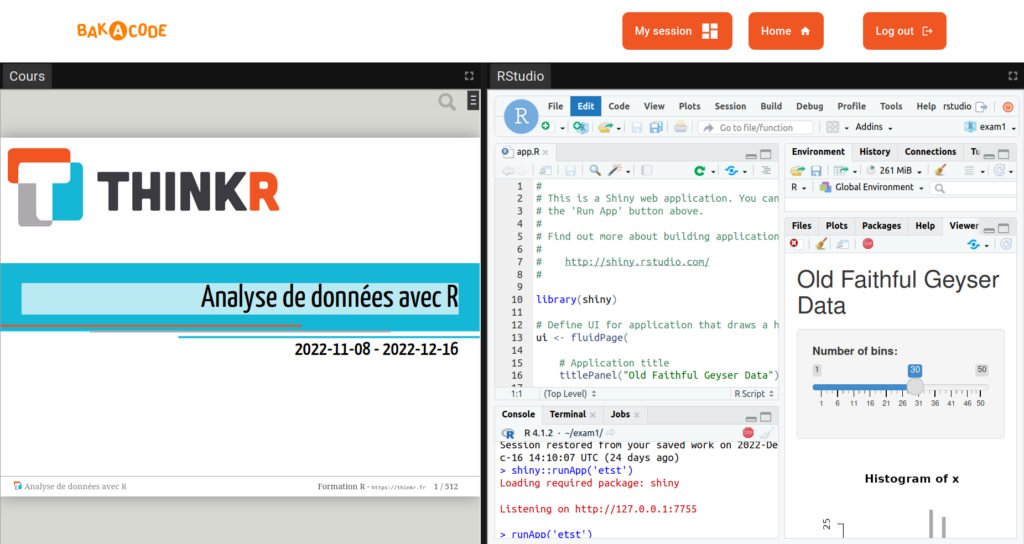Remote trainings and certification

ThinkR provides tailor-made remote trainings and certification for all topics in the R ecosystem, from data science to prod-ready Shiny applications, through developers’ tools. We have developed a dedicated e-learning platform to meet the needs of remote teaching without distractions. Also, our most senior trainers are RStudio certified trainers.
We talked about it in “Far from the virus, close to the pedagogy: Our choice to train only remotely for the year 2020“. Let’s detail this.
Our vision of remotes trainings
At the beginning of 2020, we took the decision to think about remote learning modalities. In our opinion, distance learning have unquestionable advantages, among which were the following:
- The flexibility in organizing training schedules (with the organization of half days spread over time rather than consecutive full days – to facilitate the appropriation of concepts by learners)
- The possibility to bring together learners who are geographically distant from each other (several collaborators on different sites or even in different countries)
The health crisis linked to Covid-19 has made us accelerate this thinking.
During the two months of quarantine, we have worked on a full redesign of our training materials (which, we hope, you’ll like!) and above all… a dedicated e-learning platform. We have thus developed dedicated tools and teaching materials to organize our remote training sessions in the best possible conditions. In addition, we took advantage of this period to acquire new pedagogical skills (some of which are specific to remote learning) and to make them certified.
All our most senior trainers are now certified RStudio trainers (You can play a “where is waldo?” with us on the list of RStudio certified trainers).
In practice, how the remote learning session is organized?
The instructor is present for the whole duration of the training: the learners are not left on their own, alone in the R jungle. The training is organized in the form of half days (because of the reasons presented above). For best learning conditions, training sessions will not exceed 7-10 attendees per instructor. Some teaching assistants may also help during hands-on sessions, spread among smaller groups.
The instructor and the learners meet on a e-learning platform made in ThinkR, developed by our team (and we’re not hiding the fact that we’re very proud of it!). It allows learners to have, in the same ecosystem: a pre-configured RStudio interface, the teaching materials and a chat. Learners have access to everything they need in one place, in one page. They’re not forced to go back and forth between different computer windows anymore. The instructor uses a videoconferencing tool, especially for practical work sessions.
Here is what it looks like:
 Screenshot of the BakaCode Teaching Web Platform
Screenshot of the BakaCode Teaching Web Platform
On the left, the teaching material, on the right, a working RStudio session, where you can experiment while following the course, and where you can work on the exercises provided by the instructors.
Speaking of practical work, here is a point that really matters to us and that we try to use wisely during our trainings: practice (problem solving, etc.). Indeed, it allows learners to facilitate the construction of learning. Thus, practical sessions are regularly held during the training. They are carried out independently by the learners… but always under the watchful eye of the instructor. The latter remains entirely available to accompany, unblock certain points and answer questions. The tools used allow her/him, if necessary, to have a visibility on the learners’ screens – or even to handle them – to help them when they encounter difficulties.
Certification program
In France, we are qualified to offer state-accredited certifications. And good news: you can also benefit from all the work we’ve done for that, abroad! Hence, our tutorials allow participants to be certified. Certifications require the completion of an exam at the end of the training. This exam validates the concepts learned during the training. Its format depends on the training topic but it always finishes by an individual discussion with your instructor.
Feedback from our learners
- 99% of the learners who participated in our remote learning courses would recommend them to others
- Learners who participated in our training courses give them an overall satisfaction score of 8,6/10
“Everything went very well. The instructor could even assign us into separate virtual rooms for exercises. It was very efficient as it allowed everyone to get involved into the exercises without being disturbed. The remote learning tool used also allowed the instructor to handle the learners’ computers, so that he could correct and explain the problem resolution. The remote learning has been very successful for me.”
“The remote learning course allowed us to follow the training despite the confinement linked to the Covid-19 crisis. The tool worked well and even allowed us to work in separate virtual rooms.”
Required equipment
- A computer
- A good internet connection (You can test your internet connection: we recommend a download value higher than 6 Mb/s)
- A microphone (compulsory, the default computer mic is perfect), a webcam if the learner wishes and has one (possibly the computer’s one if available), headphones to ensure the learner’s comfort – the ideal being a headset with a microphone
- Good mood 🙂
We can provide BtoB or BtoC tailor-made R remote trainings on many topics: “Beginning with R”, “Upgrade to the {tidyverse}”, “Build documented and tested packages”, “Cartography with R”, ”Building production-ready Shiny applications’. Contact us for any information.
Incoming remote training
Use cases implying trainings
- Certified Developer Training – Shiny Interfaces
- A complete certification training programme
- Shiny for production Training
- Building a training plan for ~120 people
- Complete training path: from introduction to R to Shiny application design
- Support for the development of a Shiny application
Contact us
A question ?
Tell us how we can help.
